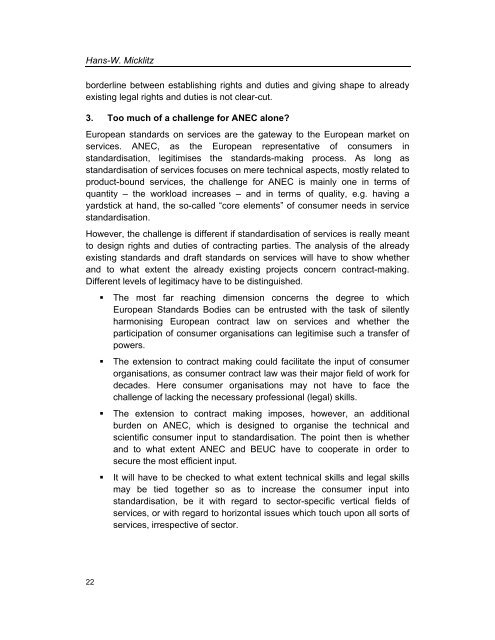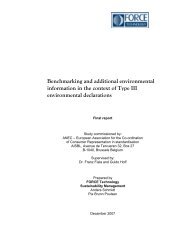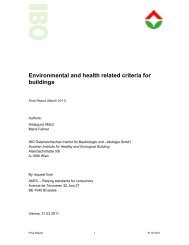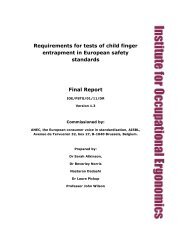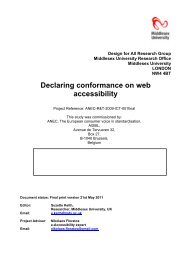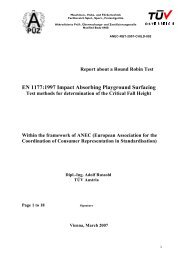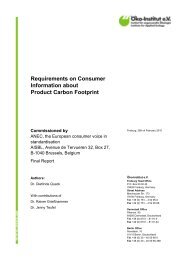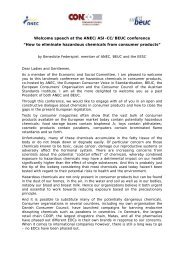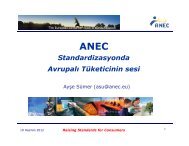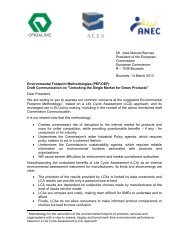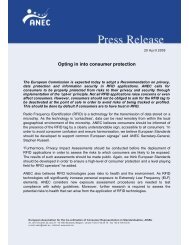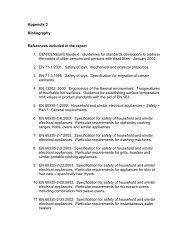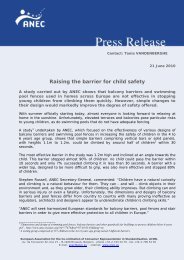Services Standards: Defining the Core Consumer Elements ... - ANEC
Services Standards: Defining the Core Consumer Elements ... - ANEC
Services Standards: Defining the Core Consumer Elements ... - ANEC
Create successful ePaper yourself
Turn your PDF publications into a flip-book with our unique Google optimized e-Paper software.
Hans-W. Micklitz<br />
borderline between establishing rights and duties and giving shape to already<br />
existing legal rights and duties is not clear-cut.<br />
3. Too much of a challenge for <strong>ANEC</strong> alone?<br />
European standards on services are <strong>the</strong> gateway to <strong>the</strong> European market on<br />
services. <strong>ANEC</strong>, as <strong>the</strong> European representative of consumers in<br />
standardisation, legitimises <strong>the</strong> standards-making process. As long as<br />
standardisation of services focuses on mere technical aspects, mostly related to<br />
product-bound services, <strong>the</strong> challenge for <strong>ANEC</strong> is mainly one in terms of<br />
quantity – <strong>the</strong> workload increases – and in terms of quality, e.g. having a<br />
yardstick at hand, <strong>the</strong> so-called “core elements” of consumer needs in service<br />
standardisation.<br />
However, <strong>the</strong> challenge is different if standardisation of services is really meant<br />
to design rights and duties of contracting parties. The analysis of <strong>the</strong> already<br />
existing standards and draft standards on services will have to show whe<strong>the</strong>r<br />
and to what extent <strong>the</strong> already existing projects concern contract-making.<br />
Different levels of legitimacy have to be distinguished.<br />
• The most far reaching dimension concerns <strong>the</strong> degree to which<br />
European <strong>Standards</strong> Bodies can be entrusted with <strong>the</strong> task of silently<br />
harmonising European contract law on services and whe<strong>the</strong>r <strong>the</strong><br />
participation of consumer organisations can legitimise such a transfer of<br />
powers.<br />
• The extension to contract making could facilitate <strong>the</strong> input of consumer<br />
organisations, as consumer contract law was <strong>the</strong>ir major field of work for<br />
decades. Here consumer organisations may not have to face <strong>the</strong><br />
challenge of lacking <strong>the</strong> necessary professional (legal) skills.<br />
• The extension to contract making imposes, however, an additional<br />
burden on <strong>ANEC</strong>, which is designed to organise <strong>the</strong> technical and<br />
scientific consumer input to standardisation. The point <strong>the</strong>n is whe<strong>the</strong>r<br />
and to what extent <strong>ANEC</strong> and BEUC have to cooperate in order to<br />
secure <strong>the</strong> most efficient input.<br />
• It will have to be checked to what extent technical skills and legal skills<br />
may be tied toge<strong>the</strong>r so as to increase <strong>the</strong> consumer input into<br />
standardisation, be it with regard to sector-specific vertical fields of<br />
services, or with regard to horizontal issues which touch upon all sorts of<br />
services, irrespective of sector.<br />
22


